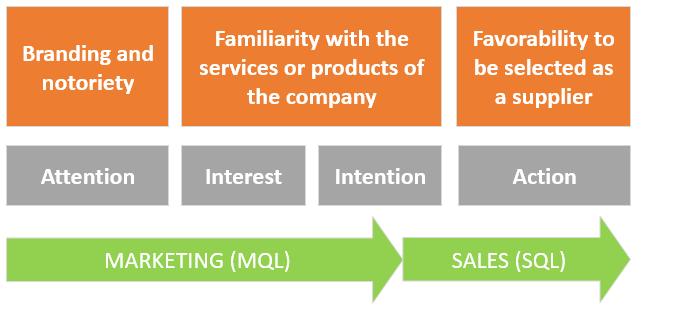Important Information
This website uses cookies. By using this website you accept the use of cookies. Learn more.

Author: Gabriela Streza, Business Development Director, Valoria
As customers are becoming more informed and have a lot of options available, it is essential that the marketing team provide opportunities to convert into sales. In this context, not less than 63% of marketing specialists say that their goals are directly related to sales. That is why the conversion rate of marketing opportunities (MQL) into sales opportunities (SQL) has become a very important indicator in many B2B fields.
However, studies by specialized companies show that the average conversion rate of MQL to SQL is only 13%. So what can be done to remedy this situation? The next three steps, once implemented, will lead to alignment and efficiency.
1. Integrated marketing and sales processes

However, when marketing and sales teams apply integrated processes, including on the conversion side of opportunities, MQLs become a clear, relevant step in the sales process. When the sales process integrates the marketing sequence related mainly to the familiarity and favourability side, not just the notoriety side, the two departments have the best framework for working effectively together.Only one in ten marketing and sales teams work well together, making the transition from MQL to SQL effectively. Sales teams ignore, on average, 50% of the opportunities generated by marketing and do not care to understand and take over these opportunities because they consider it a waste of time and effort.
2. Clear criteria for classifying opportunities
You've probably heard the saying that the more the better, the better the better. This also applies to improving the MQL / SQL conversion rate. Waiting for the sales team to sort out unclassified opportunities received from the marketing department to find those with the potential to convert is unrealistic and only leads to low conversion rates.
To solve this problem, the marketing team must use common criteria with the sales team to rank the opportunities. In this way he will be able to have a common language with the sales team and send to it the best opportunities to take and convert. Only when the marketing team has common criteria for analyzing, ranking and prioritizing the opportunities, the collaboration of the two teams will be effective and will produce results.
3. Distinctive approach by stages
The members of the marketing team often do not understand which of their opportunities are generated by the interest in the marketing content and which represent a real buying intention. This distinction means the difference between the MQL that becomes SQL and the rest. Even marketing specialists who use scoring grids to prioritize high-quality customers can miss this difference.
Marketers can distinguish between interest and intention to buy using conversational marketing. It is an area where chatbots can be used with great success. When customers with clear purchase intentions can be identified by marketing and quickly taken over by the sales department, the MQL / SQL conversion rate becomes very good.
In conclusion
MQL / SQL conversion rates are more important than ever, and marketing teams are increasingly being asked to focus on sales-related goals. While average MQL / SQL conversion rates across industries are very low, marketing teams working closely with sales teams to align MQL and SQL definitions can have excellent results. The efficiency area is focused on the quality of opportunities rather than their quantity and on prioritizing customers with a clear purchase intention.
* * *
About the author
Gabriela Streza has over 15 years of experience in marketing and business development teams of major multinational companies and family businesses in Romania, leaders in their fields of activity. Gabriela graduated from the Polytechnic University of Bucharest and has solid expertise in marketing, communication, and business development during hundreds of successfully managed projects Gabriela also has a broad knowledge of public relations and high-quality professional communication in interpersonal communications, organizations and event management to generate awareness of the company's brand and business development. In recent years he has coordinated complex marketing and business development projects involving Romanian entrepreneurs, non-profit associations and multinational companies.
About Valoria
Valoria Business Solutions is a company providing training, consulting and executive coaching services. The company's mission is to transform the potential of teams and organizations into value. Competence, confidence, innovation, and passion are the values that sustain us in everything we do. We believe in people, in their aspiration for personal and professional fulfilment, and their willingness to accelerate their potential. Learn more about us at: www.valoria.ro